BestReviews is reader-supported and may earn an affiliate commission. Details
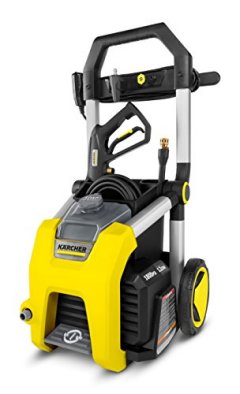
A must-have for homeowners who need reliable, strong pressure washing for household tasks like cleaning decks and driveways.
Very easy setup, so it's ready to use immediately. Delivers 1800 psi at 1.2 gallons per minute. Easy to turn on and off with a large foot switch. Its industry-standard connections make it simple to attach different hoses.
The plastic wheels and connection points may wear out more quickly.
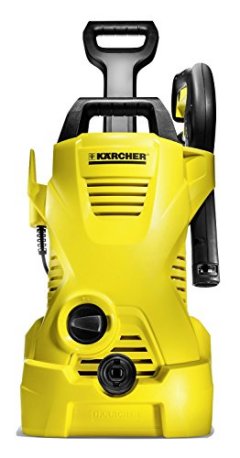
Good price for a smaller power washer that handles most jobs you have to do around the house.
Gives you 1,600 psi of water pressure and 1.25 gallons per minute of water, which compares favorably to other electric pressure washers in this price range. Able to deliver water up to 20 feet above the ground. Very small, so it's easy to store.
Design has a lot of plastic, so longevity is questionable. No onboard detergent tank.
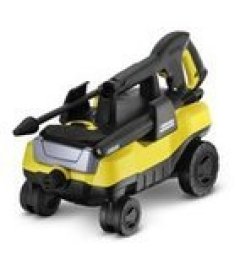
Smart design for those who need to pull the pressure washer along while working.
Uses a 4-wheel design that makes it easy to move while you're working. Good price point. Delivers 1,800 psi and 1.3 gallons per minute of water. Includes an onboard detergent tank. Control the pressure level directly from the wand.
Will not last if used constantly over time. May struggle to reach 1,800 psi level.
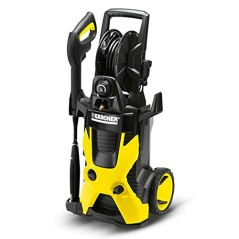
A pricey model, but the K5 has a bit more water pressure than you'll find in some other electric models.
Delivers up to 2,000 psi of water pressure and 1.4 gallons per minute of water. Reaches a water height of 25 feet. Includes a detergent tank. Great-looking design that you're going to love using for all kinds of jobs. Large handle makes it a snap to move.
Assembly can be a little difficult. May not last as long as you'd expect at this price point.
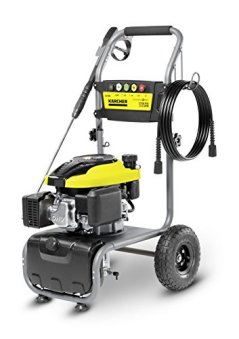
Good level of performance for a compact yet powerful gas-powered power washer.
For those who need a bit more power in a pressure washer, it delivers good performance for the home user. Offers 2,700 psi of water pressure and 2.5 gallons per minute of water delivery. Handle and 2-wheel design is easy to move.
Expensive. Gas units require more maintenance versus electric units.

We recommend these products based on an intensive research process that's designed to cut through the noise and find the top products in this space. Guided by experts, we spend hours looking into the factors that matter, to bring you these selections.

There are plenty of good pressure washers around, but Kӓrcher is perhaps the best-known brand, with a reputation for high performance backed by solid German engineering. The company has been around since 1935, and experience like that is hard to beat.
Kӓrcher’s extensive range offers a variety of solutions from light domestic cleaning to heavy industrial scrubbing – there really is something for everyone. We've been looking at the pressure washers in depth so we can offer suggestions as to which models best suit particular needs.
Our top picks underline the broad choice available and feature everything from budget-friendly household models to machines for the most demanding professionals. The shopping guide below contains more detailed information and answers to some common questions.

When you're trying to find the best Kӓrcher pressure washer, the key elements are power source, cleaning performance, and tips and nozzles.
You have a choice of plug-in electric or gas-powered washers. Your choice will depend on two considerations: convenience and performance.
Electric: Electric pressure washers are quiet and require little maintenance. The drawback is the restriction inherent in having a power cord. To many, that poses no problems, but 100 feet is the maximum with even the longest extension, which could be an issue if you have a large yard. For most homeowners, an electric pressure washer is probably more convenient.
Gas-powered: These pressure washers can be considerably more powerful than electric models and can go just about anywhere. However, they tend to be noisier, there's gas and oil to store and transport, and more maintenance is required. If you're cleaning on a professional scale, a gas-powered machine is probably the better choice.
The headline figure is usually pounds per square inch (psi), probably because big numbers are impressive! However, pressure is nothing without sufficient flow, so gallons per minute (gpm) is usually quoted as well. Karcher pressure washers range from 1,600 to 3,200 psi and from 1.25 to 2.5 gpm.
Some people are comfortable with what these figures mean, but others find them a little confusing. In order to provide a scale that makes it easier to make direct comparisons, the cleaning unit (cu) was introduced. It's calculated by multiplying the two figures together, for example:
A narrow jet of water at high pressure, with the right detergent, can clean deeply ingrained paint from concrete, but it would probably put a dent in your car's bodywork! The point is that you need different spray patterns for different jobs. For that, you need different pressure washer attachments.
Most of Kӓrcher's consumer models have a fine Dirtblaster nozzle to deliver maximum pressure and precision, plus an adjustable Vario Power spray wand for general-purpose use. On some, the wand automatically dispenses detergent (when available) at a lower pressure setting. This is convenient if, for example, you're cleaning a vehicle. Use a higher pressure to remove a lot of the dirt, turn it down to apply detergent, turn it up again to rinse.
On more commercially focused pressure washers, Kӓrcher provides interchangeable nozzles. These are heavy-duty items designed to cope with the increased pressure. The result is a more defined set of spray patterns specific to certain tasks.
Some models have one or more built-in detergent tanks, while others have a siphon that draws liquid from a container you provide, which is useful when working with high volumes.
There’s usually a clip of some kind for the spray wand. Some models have additional storage bins for accessories.
Spray wand hose lengths range from 15 to 25 feet. Gas-powered Kӓrcher pressure washers have a side hook to keep the hose neat when it’s not in use. Some consumer models have hose reels so you only have to unwind the amount of hose you need rather than have an untidy heap on the floor.
As a safety feature, the motor doesn't run unless the trigger is pressed. On professional models, the triggers have child safety locks.
The wheels on consumer machines are hard plastic, which is perfectly adequate, though they can crack if treated badly. On professional-grade Kӓrchers, we prefer to see pneumatic tires, which perform better on a variety of surfaces and are less prone to damage from knocks and bumps.
You’ll find a wide variety of additional accessories for specific tasks: brushes for washing vehicles, cleaning heads for hard surfaces, and extra hose, for example. It might also be possible to fit third-party accessories, but the connectors aren't always universal, and some devices have maximum pressure ratings, so check before ordering.
All Kӓrcher pressure washers are guaranteed for two years, so we don't have to make our usual warning about cheap devices often being poor quality. While Kӓrcher pressure washers are definitely a premium product, they remain affordable.
The smart little K3 Follow-Me is a shade under $100, and the very capable K2 family of machines is around $20 more. The K5s will handle the toughest of household tasks, but the high-spec 540 with its water-cooled motor and built-in hose reel is still under $350.
You might expect gas-powered Kӓrchers to be more expensive, but that's not the case. These powerful machines (2,200 psi to 3,000 psi) can usually be found for between $250 and $350.

A. Water conservation is a real concern in many areas, so this is an important question. If you've been using an ordinary hose to clean your car, for example, then a Kӓrcher pressure washer should actually save water. The flow rate of a garden hose on a typical household supply is around 800 gallons per hour. Kӓrcher's consumer-rated pressure washers run at between 60 and 160 gallons per hour. Because of the greater pressure, they also clean more efficiently. You'll get the job done more quickly, which reduces the amount of water used even further.
A. No. Never. Bleach can do serious damage to the seals inside the machine's pump, likely leading to expensive repairs. You shouldn't spray bleach anyway – it's dangerous to your airways and lungs, and any overspray will kill plants and cause random damage.
If you have problems with mold and fungus, try a solution of three parts water to one part white vinegar. It's not poisonous, but some find the vapor a little unpleasant, so wearing a lightweight face mask is a good idea.
A. Too much pressure does have the potential to damage vehicle paint, but it's easily avoided. Automotive experts recommend keeping the pressure below 1,800 psi. While some Kӓrcher pressure washers can exceed this, those aimed at home use do not. If you're using a commercial-grade device, turn the pressure down and use a wide-angle nozzle.
Get emails you’ll love.
Learn about the products you’re wondering if you should buy and get advice on using your latest purchases.
